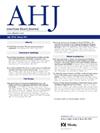Genotype-guided de-escalation and abbreviation of dual antiplatelet therapy in patients with myocardial infarction and high bleeding risk: Design and rationale of the investigator-initiated, multicenter, randomized, controlled trial, DAN-DAPT
IF 3.7
2区 医学
Q1 CARDIAC & CARDIOVASCULAR SYSTEMS
引用次数: 0
Abstract
Rationale
Approximately one-third of patients with myocardial infarction (MI) treated with percutaneous coronary intervention (PCI) are at high risk of bleeding side-effects when on dual antiplatelet therapy (DAPT). High bleeding risk is often accompanied by high ischemic risk, thus challenging the choice of P2Y12 inhibitor and duration of DAPT. The optimal DAPT strategy for these patients remains debated, and it is unknown whether genotype-guided DAPT de-escalation to clopidogrel and aspirin, with or without abbreviation of DAPT to 3 months, is noninferior in terms of net adverse clinical events (NACE) and superior in reducing bleeding side-effects compared with standard DAPT for 6 months.
Design
The DAN-DAPT trial is an investigator-initiated, open-label, multicenter, multiarm, randomized controlled trial conducted at all Danish hospitals performing PCI. From 2022 to 2029, we planned to randomize 2,700 patients with MI and high bleeding risk in a 1:1:1 ratio to 1 of 3 groups: CYP2C19-genotyping and 6 months DAPT (experimental group 1), CYP2C19-genotyping and 3 months DAPT (experimental group 2), and 6 months DAPT with prasugrel (or ticagrelor) and aspirin (control group). The coprimary outcomes are NACE defined as the composite of all-cause mortality, recurrent MI, definite stent thrombosis, stroke, and BARC type 3-5 bleeding (Bleeding Academic Research Consortium), and major and minor bleedings defined as the composite of BARC type 2-5 bleedings at 1 year.
Conclusion
DAN-DAPT trial is an open-label, multicenter, randomized controlled trial comparing genotype-guided DAPT de-escalation to clopidogrel - with or without DAPT abbreviation to 3 months - and standard DAPT for 6 months after PCI in high bleeding risk patients with MI. As of March 2025, 36% of the planned 2,700 patients have been enrolled in the study.
Trial Registration
ClincialTrials.gov (NCT05262803) and EU number (2022-500125-32-00).
基因型引导的心肌梗死和高危出血患者双重抗血小板治疗的降级和简化:研究者发起的多中心随机对照试验DAN-DAPT的设计和基本原理
理由:大约三分之一接受经皮冠状动脉介入治疗(PCI)的心肌梗死(MI)患者在接受双重抗血小板治疗(DAPT)时存在出血副作用的高风险。高出血风险往往伴随着高缺血风险,这对P2Y12抑制剂的选择和DAPT的持续时间提出了挑战。这些患者的最佳DAPT策略仍然存在争议,并且尚不清楚基因型引导的DAPT降级为氯吡格雷和阿司匹林,或不缩短DAPT至3个月,是否在净不良临床事件(NACE)方面不逊色,在减少出血副作用方面优于标准DAPT 6个月。设计:DAN-DAPT试验是一项研究者发起的、开放标签、多中心、多组、随机对照试验,在丹麦所有实施PCI的医院进行。从2022年到2029年,我们计划将2700例MI和高出血风险患者按1:1:1的比例随机分为三组:cyp2c19基因分型和6个月DAPT(实验组1),cyp2c19基因分型和3个月DAPT(实验组2),6个月DAPT联合普拉格雷(或替格瑞洛)和阿司匹林(对照组)。主要结局为NACE,定义为全因死亡率、复发性心肌梗死、明确的支架血栓形成、卒中和BARC 3-5型出血(出血学术研究联盟)的复合,以及大出血和小出血,定义为BARC 2-5型出血的复合。结论:DAN-DAPT试验是一项开放标签、多中心、随机对照试验,比较基因型引导的DAPT降级至氯吡格雷(有或不有DAPT缩写至3个月)和标准DAPT在PCI后6个月对高危心肌梗死患者的影响。截至2025年1月,计划的2700例患者中有34%纳入了该研究。试验注册:ClincialTrials.gov (NCT05262803)和欧盟编号(2022-500125-32-00)。
本文章由计算机程序翻译,如有差异,请以英文原文为准。
求助全文
约1分钟内获得全文
求助全文
来源期刊

American heart journal
医学-心血管系统
CiteScore
8.20
自引率
2.10%
发文量
214
审稿时长
38 days
期刊介绍:
The American Heart Journal will consider for publication suitable articles on topics pertaining to the broad discipline of cardiovascular disease. Our goal is to provide the reader primary investigation, scholarly review, and opinion concerning the practice of cardiovascular medicine. We especially encourage submission of 3 types of reports that are not frequently seen in cardiovascular journals: negative clinical studies, reports on study designs, and studies involving the organization of medical care. The Journal does not accept individual case reports or original articles involving bench laboratory or animal research.
 求助内容:
求助内容: 应助结果提醒方式:
应助结果提醒方式:


